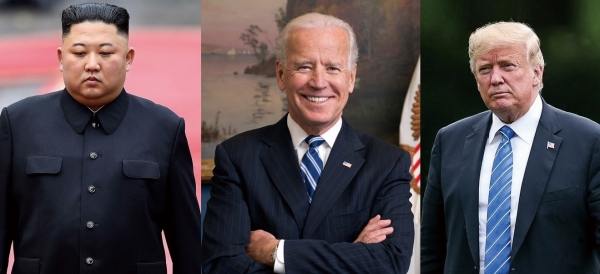
바이든의 미국 대통령 당선은 미국과 세계와의 관계에 있어 낯설고 불확실한 상황을 전개한다. 그는 유럽에서부터 중동, 아시아에 이르기까지 상처난 민감한 문제를 달래고 다자외교를 선택하며 미국이 진정으로 약속을 지키고 조약 의무를 준수할 것임을 동맹국들에 보장하면서 트럼프에 의한 피해의 일부를 회복할 것이다.
한국, 남북한의 도전보다 더 큰 문제는 어디에도 없다. 내년 1월 20일 바이든의 취임식 때까지 트럼프가 문재인 한국 대통령을 우습게 보며 그의 친구인 김정은과의 관계를 공고히 하기 위해 무엇을 할지는 알 수 없다.
바이든이 오바마 대통령 시절부터 경험을 가진 협상 전문가들에게 의존할 것이라는 의식 외에 대북정책의 진전에 대한 확신도 별로 없다. 바이든은 오바마 정부 당시 부통령으로서 그들을 잘 알고 있기에 북한 사람들을 대할 때의 어려움에 대해 현실적인 시각을 가져야 한다.
임기가 끝나기 전 남은 시간에 트럼프 대통령은 협상가들의 조언을 넘어 자신의 개인적 톱다운 방식의 지혜를 보여주기를 간절히 바라고 있다. 그는 김정은과 세 번의 만남에서 무엇인가 이뤄냈다고 주장하고 싶어 할 것이다.
그는 그들이 2018년 6월 12일 싱가포르에서 서명한 ‘핵 없는 한반도’를 향해 노력하겠다고 약속한 성명서를 언제든 들먹이며 그는 김정은에게 핵 및 미사일 시험 중단을 설득함으로써 제2의 한국전쟁을 피했다고 주장할 것이다.
혼란스러운 미 정책, 한국은 곤란에 처할 것
김정은이 핵 포기를 시작하지 않았다는 사실은 바이든이 마침내 그를 받아들이게 하는 마법의 공식으로 길을 열어준다. 그러나 오바마 행정부의 ‘전략적 인내’가 실패한 점을 감안하면 바이든의 접근법이 훨씬 더 좋을 것이라는 뜻은 아니다. 오바마의 전임자인 조지 W 부시 대통령의 대통령 시절 당시 무엇보다 조심스럽게 기다리는 것은 트럼프의 화려한 헤드라인을 장식하는 익살보다도 성공적이지 못했다.
미국 정책의 우여곡절 속에서도 한국은 곤란한 입장에 처할 것이다. 서울의 청와대 대통령이 진보든 보수든 상관없이, 한국인들은 워싱턴의 백악관에 있는 대통령이 어떤 이상한 전술을 염두에 두고 있는지 경계해야 한다. 미 의회가 정치적 이익을 우려하며 국내 도전에 집착하는 가운데 미국의 정책은 더 인식하기 어렵기 때문이다.
백악관을 비워야 하기 몇 주 전, 트럼프는 아프가니스탄과 이라크에서 미군 철수를 명령함으로써 한국에 충격을 줄 수 있다. 그는 2만8500명을 모두 철수시킬 수는 없지만 몇 천 명을 집으로 데려올지도 모른다. 국방부와 상의하지 않고 행동할 수 있다고 말하는 근거는 남한이 미국의 방위비 분담금을 대폭 인상하라는 그의 요구에 굴복하지 않았기 때문일 것이다.
김정은, 바이든도 좌지우지 하려고 할 것
그 결정을 내리기 전에 트럼프는 여전히 한국을 괴롭혀 거래를 성사시키기를 희망할 것이다. 지난해 9억2700만 달러에서 대폭 늘어난 50억 달러에 대한 그의 요구는 터무니없는 협상 책략이었지만 그는 남한이 수억 달러를 더 지불해야 한다고 주장할 만하다. 한국 협상단은 적은 액수 이상의 비용을 부담하도록 강요하려는 시도에 반발하고 있지만 문재인 대통령은 북한과의 화해를 꿈꾸고 있다.
우리는 바이든이 악감정 없이 협정을 갱신한 후 대북 정책에 대한 검토를 계속하기를 원할 것이라고 합리적으로 확신할 수 있다. 바이든 대통령은 문 대통령과 친분 쌓기를 시도할 예정이지만 북한의 요구에 얼마나 강하게 맞설지는 미지수다. 그는 싱크탱크 전문가들과 한때 북한과의 대화 경험을 쌓은 전직 국무부 사람들을 부를 것이다.
하지만 다시 이판에 끼어들고 싶어 하는 열성적인 전직 외교관들의 마음과 입에서 쏟아져 나오는 지혜를 기대하지는 마라. 그 중 한 명인 크리스토퍼 힐은 남북한과 미국, 중국, 일본, 러시아 4강이 참여한 6자회담을 통해 수년간 미국 협상단을 이끌었지만 아무 것도 얻지 못했다. 그는 북한의 김계관과의 대화에서 뭔가 실적이 있었다고 생각했지만 북한은 핵을 포기하겠다는 약속을 지키지 않았다.
바이든 중국에 강경하지 않을 수도
부시도 오바마도 북한과 어떠한 협상도 이뤄내지 못했다는 사실은 바이든에게 별로 좋지 않다. 과거 전력으로 비춰 볼 때 북한의 유일한 우방인 중국에 강경 노선을 취할 의지가 없을 수도 있다.
오히려 남중국해에 대한 중국의 주장과 대만에 대한 위협, 히말라야 국경을 따라 인도와의 끝없는 충돌에도 불구하고 중국과의 긴장을 완화하고 싶어 할지도 모른다.트럼프 역시 터프하지 않다. 싱가포르 정상회담 이후 한미 양국군이 매년 실시하는 연합 군사훈련 중단을 흔쾌히 지시했고 싱가포르 정상회담,
이후 2019년 2월 하노이회담 그리고 4개월 후 비무장지대(DMZ)의 3차례 회담을 전후해 김정은이 지시한 단거리·중거리 미사일의 무수한 시험발사에 아랑곳하지 않는 모습이다.
트럼프는 김정은이 핵을 포기하라는 요구에 불응하자 하노이회담을 중단하는 모습을 보였다. 그러나 트럼프는 두 사람이 ‘사랑에 빠졌다’며 싱가포르에서 역사를 만들고 있다고 믿는다. 트럼프는 그가 여전히 보스라는 것을 보여주려는 절박함 속에서도 완전히 예측불허로 남아 있다.
김정은에게는 달콤한 바이든이 한국전쟁을 공식적으로 종식시키는 ‘평화선언’을 하도록 설득하는 것보다 더 나은 것은 없을 것이다. 그것은 미군 철수를 불러오기 위한 계략일 뿐이다. 결국 김정은은 트럼프와 마찬가지로 바이든을 좌지우지하려고 할 것이다.
번역 미래한국 편집부

Biden May Be Tougher Than Trump on North Korea but May Still Ignore South Korea’s Interests
Joe Biden’s election as president of the U.S. opens a strange, uncertain chapter in America’s relations with the rest of the world. He’ll be repairing some of the damage done by Donald Trump, placating wounded sensitivities from Europe to the Middle East to Asia, opting for multilateral diplomacy and assuring allies that the U.S. really means to keep its word and live up to treaty obligations.
Nowhere is the challenge greater than with Korea, both Koreas, North and South. From now until Biden’s inauguration on January 20, there’s no telling what Trump might do to cement his relationship with his friend in Pyongyang, Kim Jong-un, while displaying contempt for South Korea’s President Moon Jae-in.
Nor is there much certainty as to the evolution of Biden’s policy toward North Korea other than the sense that he’ll rely on negotiators with experience from the presidency of Barack Obama. Biden, as vice president during that period, knows them and should have a realistic view of the difficulties of dealing with the North Koreans.
Trump in the window of time remaining before the end of his term dearly hopes to show the wisdom of his personal top-down approach, above and beyond the advice of negotiators. He would like to claim that he got somewhere in three meetings with Kim. He can always point to the statement they signed in Singapore on June 12, 2018, in which they promised to work toward a “nuclear-free Korean peninsula,” and he’ll go on claiming to have avoided a second Korean War by persuading Kim to suspend testing nukes and missiles.
The fact that Kim did not begin to give up his nuclear program leaves the way clear for Biden to show that he can finally come up with the magic formula for bringing him to terms. Biden’s approach, however, does not mean that he will do much better considering the failure of the “strategic patience” of the Obama administration. Watchful waiting, on top of talks going back to the presidency of Obama’s predecessor, George W. Bush, was no more successful than Trump’s flashy head-line-grabbing antics.
South Korea, in the midst of all the twists and turns of U.S. policy, is caught in the middle. Regardless of whether the person in the Blue House in Seoul is liberal or conservative, South Koreans have to be wary of whatever weird tactics the man in the White House in Washington has in mind. U.S. policy is all the more difficult to perceive while the American Congress is deeply divided, concerned about political advantage and obsessed with domestic challenges.
In the weeks before he has to vacate the White House, Trump could shock Korea as he did Afghanistan and Iraq by ordering American troops out of South Korea. He could not possibly pull out all 28,500, but he might bring a few thousand home. The rationale for acting without consulting the Pentagon would be the refusal of South Korea to yield to his demand for a vast increase in payment for U.S. defense of the South.
Before reaching that decision, Trump would still hope to bully South Korea into a deal. His demand for $5 billion, up from $927 million last year, was an outrageous bargaining ploy, but he may well insist the South has to pay several hundred million more dollars. South Korean negotiators are resisting an attempt at forcing them to pay more than a small increase while Moon fantasizes reconciliation with North Korea.
We may be reasonably confident that Biden will want to see renewal of the bases agreement with a minimum of acrimony and then get on with a review of policy toward North Korea. Biden will attempt to build up rapport with Moon, but it’s not clear how strongly he’ll stand up to North Korea’s demands. He will have at his beck and call a pool of think-tank experts and former State Department people who once were immersed in talks with the North.
Don’t count, though, on real wisdom pouring from the minds and mouths of eager ex-diplomats who would love to get in the game again. One of them, Christopher Hill, led U.S. negotiators for years through six-party talks, including both Koreas and the four major powers with the biggest stakes on the Korean peninsula, the U.S., China, Japan and Russia, but got nowhere. He thought he had a deal in talks with North Korea’s Kim Kye-gwan, but the North did not begin to live up to its promise to give up its nukes.
The fact that neither Bush nor Obama got anywhere with North Korea does not augur well for Biden. Judging from his past record, he may not have the will to pursue a hard line involving China, North Korea’s only ally. Rather, he may want to ease tensions with China despite China’s claim to the South China Sea, threats against Taiwan and never-ending clashes with India along their Himalayan frontier.
Trump is no tough guy either. After the Singapore summit, he readily ordered a halt to the joint military exercises conducted annually by South Korean and U.S. troops, and he did not appear concerned by the numerous tests of short and mid-range missiles ordered by Kim before and after their three meetings, including Singapore, then Hanoi in February 2019 and at the Demilitarized Zone four months later.
Trump made a show of cutting off the Hanoi meeting when Kim balked at demands to give up his nukes but believed he was making history by seeing him In Singapore where he believed the two fell “in love.” Now, in his desperation to show he’s still the boss, Trump remains thoroughly unpredictable.
Kim would like nothing better than to persuade sweet Joe Biden to go along with a “peace declaration” formally ending the Korean War. That would only be a ruse to bring about withdrawal of American troops. In the end, Kim would hope to twist Biden around his little finger just as he did with Trump.
외부게재시 개인은 출처와 링크를 밝혀주시고, 언론사는 전문게재의 경우 본사와 협의 바랍니다.


